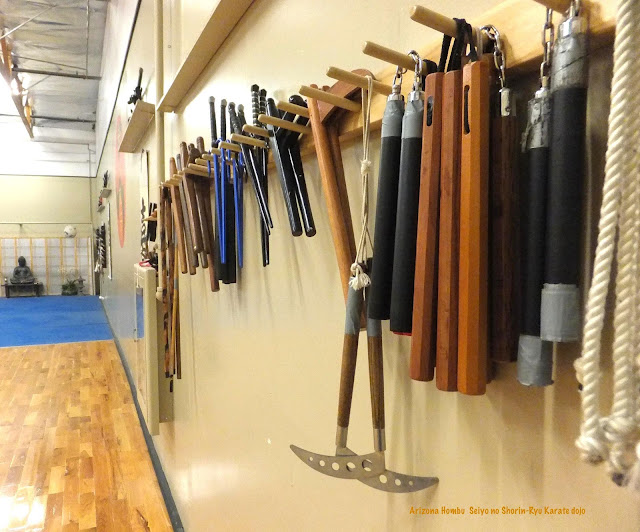 |
Grandmaster Hausel continues to receive national &
international recognition in expertise in martial arts &
teaching abilities. |
The Arizona Hombu Karate Dojo is the best martial arts school in the Phoenix Valley, of Arizona, based on 'Expertise'.
This relates to expertise of martial arts instructors, outstanding students, and traditional Okinawa martial arts curriculum that is unmatched in the state. The school in Mesa in the east valley of Phoenix, offers classes in Karate, Kobudo (these are the well-known martial arts weapons from Okinawa), Samurai Arts, and Self-Defense. But in each of these categories and many different martial arts taught at the school. For instance, Kobudo includes many arts such as bojutsu, nunchakujutsu, tekkojutsu, saijutsu, tonfajutsu, ekujutsu, and several more. Then, samurai arts are the classical arts of Japanese samurai which includes bojutsu, iaido (samurai sword), sojutsu (spear), naginatajutsu (pole arm), hanbojutsu (half-bo) and many more arts.
 |
Dr. Florence Teule (France), recently
appeared on Stan Lee's Super-humans.
Here she practices kenjutsu taught by
Who's Who in Martial Arts Legend, Soke
Hausel at a clinic in Gillette, Wyoming |
The karate dojo focuses on adults, families, and traditions. While many classes around the Phoenix Valley are taught by teens with little expertise, the Hombu karate school has highly educated instructors and students. Where else can you find a martial arts school filled with university faculty, school teachers, engineers, rocket scientists, scientists, authors, accountants, musicians, lawyers, nurses, pilots, computer techs, doctors, including a Hall-of-Fame geologist, and a couple of Hall-of-Fame martial artists. In fact, the dojo is operated by a Hall-of-Fame martial artist who is also a Who's Who in Martial Arts Legend and was presented one of only a handful of awards recognizing him as a martial arts genius! So, you decide: - (1) take martial arts from a teenager, or from a school with adult instructors that have more than 2 CENTURIES of combined martial arts experience. Currently, the martial arts school attracts about 30% women as well as young adults and senior citizens and some families.
The Hombu Dojo has been around for many years and was initially established at the University of Wyoming. The Hombu moved to Arizona in 2006 from the University of Wyoming, where the school was initially established as a dojo on campus for 30 years after moving from the University of New Mexico and from the University of Utah.
Much of the curriculum at the Arizona Hombu Karate Dojo (aka Arizona School of Traditional Karate) focuses on the traditional Shorin-Ryu martial arts. Shorin-Ryu was developed on Okinawa and has origins in the Chinese Shaolin martial arts.





































.jpg)
%2B-%2BCopy.JPG)
.JPG)


.+Heather+From.JPG)
.jpg)
.JPG)
+Okinawa+Sunset+-+color+pencil+sketch+by+soke+hausel+(Seiyo-shorinryu.com).JPG)